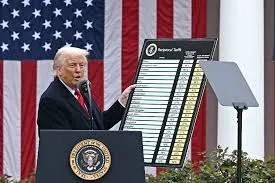
14% Tariff on Nigeria: Trump’s Strong Opposition
On April 2, 2025, President Donald Trump announced the implementation of a 14% tariff on imports from Nigeria as part of a broader trade policy introducing a baseline 10% tariff on all imports, with higher rates for specific countries. The administration justifies the 14% tariff on Nigerian goods by citing Nigeria’s 27% tariff on U.S. products, aiming to address perceived trade imbalances through “reciprocal tariffs.”
This policy affects 185 countries, with varying tariff rates based on existing trade practices. For instance, Algeria faces a 30% tariff, Côte d’Ivoire 21%, and Lesotho 50%. The administration asserts that these measures are intended to protect American industries and promote fair trade.
Critics argue that such tariffs could lead to increased consumer prices and potential retaliation from affected nations, potentially escalating into a trade war. The Nigerian government has yet to respond officially to the new tariffs. Economists suggest that the impact on Nigeria’s exports to the U.S. will depend on the price elasticity of the goods involved.
The tariffs are scheduled to take effect at 12:01 a.m. (ET) on April 5, 2025.